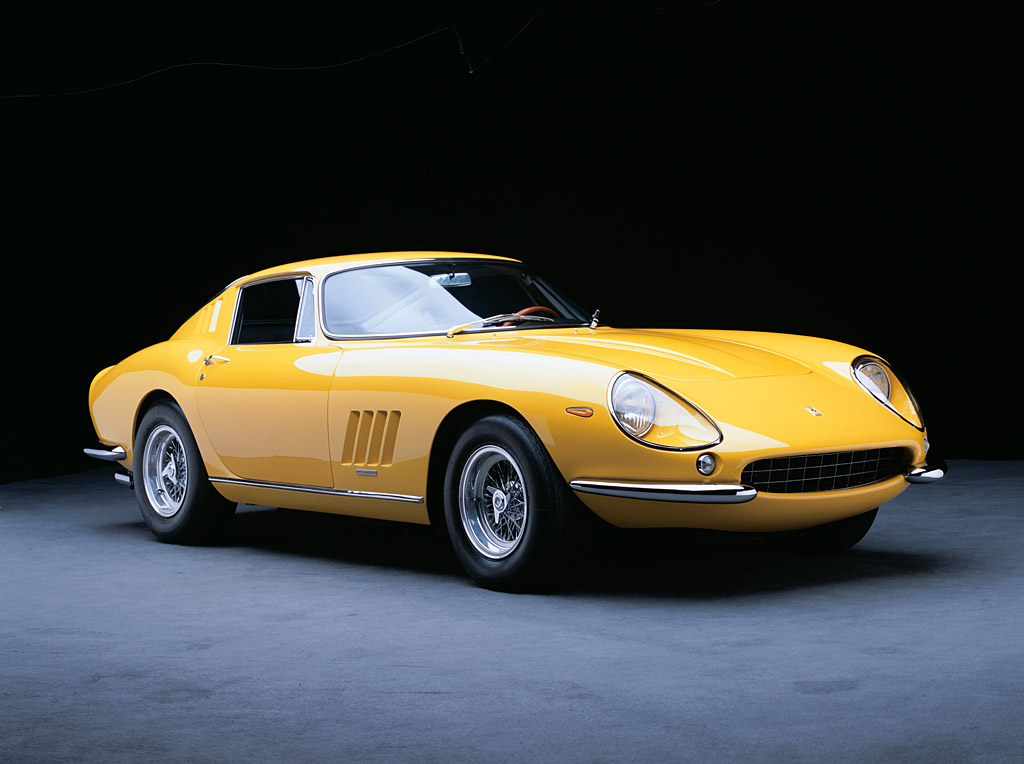
The most important new features of the 275 GTB were the rear-mounted gearbox and independent rear suspension.
The first time of a combined gearbox and differential unit in a transaxle assembly, and the provision of independent rear suspension.
The company already had plenty of experience of both systems in their competition cars, the technology of which filtered through to the road models, another case of racing improving the breed. The bodies were mounted on a 2400mm wheelbase chassis that had factory reference numbers 563, and then 563/66, all were numbered in the odd chassis number road car sequence.
The construction was along the same basic lines as that of the previous models, but with a tapering rear main tube section, due to the revised transmission and rear suspension assembly.
The model was available in right or left hand drive form. The standard wheels were alloy of two different patterns, a “starburst” design on early cars, and a simple elegant ten hole design on later “long nose” cars, with the option of Borrani wire wheels throughout the production period. Apart from the standard road cars a small series of client competition examples were built, along with a trio of special bodied competition berlinettas.
The first series of ten “competition” examples were of the “short nose” variety, an aluminium body, and six carburettors. However, they received carefully built and balanced engines to racing standards, a larger fuel tank, and frequently an external fuel filler.
Ferrari Ferrari 275 GTB Technical Specifications
Year of Manufacture - 1964
| ENGINE | ||
| type | front, longitudinal 60° V12 | |
| bore/stroke | 77 x 58.8 mm | |
| unitary displacement | 273.81 cc | |
| total displacement | 3285.72 cc | |
| compression ratio | 9.2 : 1 | |
| maximum power | 206 kW (280 hp) at 7600 rpm | |
| power per litre | 85 hp/l | |
| maximum torque | - | |
| valve actuation | single overhead camshaft per bank, two valves per cylinder | |
| fuel feed | three or six 40 Weber DCN/3 carburettors | |
| ignition | single spark plug per cylinder, two coils | |
| lubrication | wet sump | |
| clutch | single-plate | |
| CHASSIS | ||
| frame | tubular steel | |
| front suspension | independent, unequal-length wishbones, coil springs over telescopic shock absorbers, anti-roll bar | |
| rear suspension | independent, unequal-length wishbones, coil springs over telescopic shock absorbers, anti-roll bar | |
| brakes | discs | |
| transmission | 5-speed + reverse | |
| steering | worm and roller | |
| fuel tank | capacity 94 litres | |
| front tyres | 195 or 205 x 14 | |
| rear tyres | 195 or 205 x 14 | |
| BODYWORK | ||
| type | two-seater berlinetta | |
| length | 4325 mm | |
| width | 1725 mm | |
| height | 1245 mm | |
| wheelbase | 2400 mm | |
| front track | 1377 mm | |
| rear track | 1393 mm | |
| weight | 1100 kg (dry) | |
| PERFORMANCE | ||
| top speed | 258 km/h | |
| acceleration 0-100 km/h | - | |
| 0-400 m | - | |
| 0-1000 m | - | |
Ferrari 275 GTB Valuations
Widely considered to be one of the greatest Ferrari's produced of the 1960s due to its stunning design and perfect weight balance, the 275 GTB will always have great appeal and none more so than the alloy-bodied cars with fewer than 60 road examples built.
In February 2018 a 1965 Ferrari 275 GTB Alloy by Scaglietti sold for £2.8 Million.
